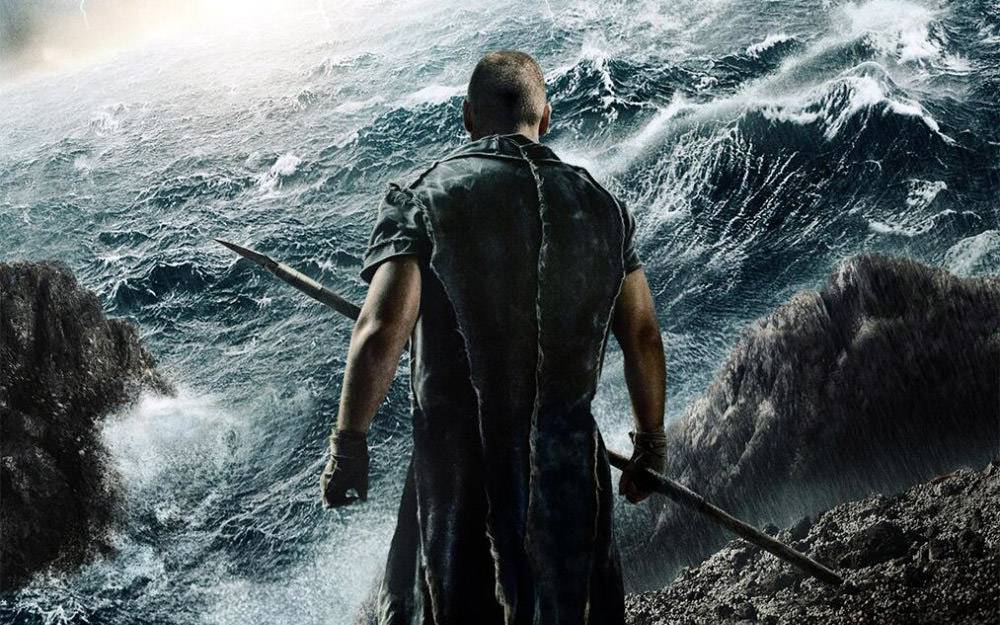Reconsidering Darren Aronofsky’s Noah

I originally had little to no desire to see Darren Aronofsky’s take on the story of Noah. Not so much because I was afraid that his version would be a lackluster, even disrespectful take on Scripture, but rather because the Noah trailers and promotional materials made it look like yet another generic, action-packed, CGI-heavy Hollywood period piece. (Sidenote: I wonder what that says about me, that I was more concerned by Hollywood genericism than, say, possible disrespect of my religion’s central text.) The “controversies” surrounding both the studio’s attempts to market to religious audiences and Noah’s supposed environmentalist undertones only further increased my ambivalence.
But I saw rumblings online that hinted that the film was something unexpected — and then I read Steven Greydanus’ interview with Aronofsky and co-writer Ari Handel. The duo’s comments concerning their inspiration for the movie, their approach to the various flood narratives, and the story’s moral/ethical quandaries were quite interesting.
SDG: The film takes us to a time when man’s understanding of God isn’t just pre-Christian: It’s pre-Davidic, pre-Mosaic, pre-Abrahamic. So Noah’s understanding of God may seem very foreign to us today. On the other hand, some nonbelievers reading Genesis argue that the Creator depicted there isn’t so good. How do you see the Creator in the story as you’ve told it?
Aronofsky: It’s a very good question. If you look at the story in Genesis, it begins with the wickedness of the world. And God forms this decision to start over again. And so, for us, the beginning of the story is about justice.
By the end, God makes a covenant and presents the rainbow as a promise that it won’t ever happen again. For us, that’s mercy. So the story has this transition from justice to mercy.
Noah in the text doesn’t have much of a character arc. He follows along with God. So we decided to give the same sort of path to Noah: of wanting justice at the beginning and eventually finding mercy.
There’s a lot of anger at the beginning. But I think it’s justified: God’s anger — in [the text and] in this film as well, because we do show how wicked man had become, as well as we could.
And then there’s Greydanus’ indepth review of the film, which discusses both the liberties taken by the filmmakers as well as their faithfulness to the original text.
For millennia, Judeo-Christian imagination has been haunted by the idea of the primordial world before the Flood: a world so close to paradise, with Eden itself around some forbidden corner, guarded by cherubim with a flaming sword. Men lived many hundreds of years, Genesis tells us, and chapter 6 suggests that giants walked the earth — offspring, on one interpretation, of human women and fallen angelic beings.
Some of these motifs inspired elements in J.R.R. Tolkien’s tales of the earlier ages of Middle-Earth, an imaginative portrait of the primeval world. Tolkien’s best-known works, The Hobbit and The Lord of the Rings, resound with echoes of this lost world. Aronofsky’s Noah includes imaginative flourishes akin to Tolkien: grim portents, grotesque Entish creatures called Watchers, battles in a Mordor-like blasted waste and a dark family struggle not unlike that of Denethor and his sons.
Yet the story’s biblical framework is taken seriously, even literally. There are glimpses of Eden, Adam and Eve in glory, the serpent, the forbidden fruit and the crime of Cain. Though paradise is lost, the Earth has not yet forgotten it, as Tolkien’s rocks and woods remembered the elves after they had gone. In a key sequence, an echo of Eden bursts forth in a rapturous effect recalling Genesis 2:9 – 10.
Then there’s Peter Chattaway’s comments on the film, particularly his conclusion:
I am very grateful that this film exists — partly because it has the potential to bring back the Bible epic as a genre to be reckoned with for the first time in almost half a century, and partly because I have learned a bit more about the Jewish tradition while reading up on this film and its source material, and partly because it’s a dynamic piece of filmmaking in its own right, but also because the film takes the Bible seriously and asks us to do the same.
On one level, it’s a popcorn movie, sure, full of visual effects and whatnot. But it also challenges its audience — believers and unbelievers alike — to think about how we balance justice and mercy in our lives.
When folks like Greydanus and Chattaway (to name a few) praise a film like that, particularly one with so much theological/Biblical content, that’s enough to make me have second thoughts.